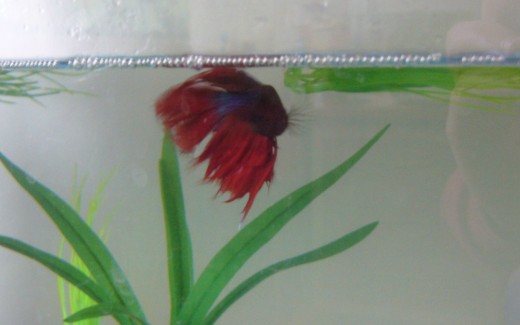Betta Spawning Throws Doubt On Human Free Will

Recently, I've been privileged enough to see two of my bettas spawn and create new life. Even as I type little newborn hatchlings are hanging about at the top of the spawn tank being all alive and what not. The miracle of creation has unfolded! (Whether or not any of them making it past the first couple of weeks is hugely debatable, but this article isn't about that. This article is about the sheer majesty of that which we humans call 'instinct'.
The betta male you see here tending his spawn is called 'Chow'. He is about two inches long (not including his fins,) and he has a brain significantly smaller than the size of your average pin head. Two days ago, Chow mated with his partner, collected the eggs she dropped and deposited them into a bubble nest he created of his own accord.
Since then, Chow has not eaten. He has done nothing but patrol the tank, looking for eggs that may have dropped out of the nest. When he spied such eggs he caught them in his mouth and ferried them back to the top of the tank where he spat them back into the bubble nest.
Periodically he would take a few eggs out of the nest, swirl them around in his mouth to clean them and prevent fungus from growing on them, and then spit them back into the nest. During the night he has moved the nest twice, ensuring, one assumes, that it is not discovered by predators.
Somehow, this little fish who was never given a book on spawning, nor given a kindly talk on the duties of the male betta, has perfectly tended his young. He has engaged in complex behaviors which make those of most mammals seem simple, and he has thus far successfully raised his young.
If we compare this to the role of the male mammal, which is to rub about a bit and then stroll off for a few months or forever, we see that the male betta fish behaves incredibly. His role is a delicate and intricate one and yet he performs it entirely naturally with no prompting whatsoever. We call this instinct, yet I would call it something else, I would call it 'programming'. Hardwired into this betta's brain are all the instructions he needed to spawn and raise his young.
If we think that a tiny fish can have such complex programming built into it, then what of ourselves? We assume that our mate selection and consequent breeding is the result of us making free will choices. We think we select partners with great conscious care, we think that we choose whether or not to have children, (though accidents are not uncommon,) but I ask, how much of our seemingly complex human behavior is actually the result of free will? If a small fish no bigger than my finger has the programming to perform these intricate procedures, then how much more programming must my significantly larger brain carry with it?
We must also consider that this programming is not limited to mating and breeding behavior, but to all aspects of our lives. We like to think that we are the great conscious and sentient species on earth, but are we truly sentient? And if we are, how much does that ultimately impact the way in which we behave?
The more time one spends with so called “lower” life forms, the more one sees our own behaviors reflected in miniature. Ants, for instance, create large and intricate societies in which every member plays a role, much like a human society.
We certainly have the ability as humans to interpret the world around us and to respond to it in a fashion that resembles sentience. We are aware enough to foresee and fear our own demises and ensure that we do not go to them too quickly. Generally, we love our young and provide for them the best we can, however, sometimes humans will destroy their own young, much like a mother rat who is disturbed with her babies and eats them alive. When human mothers kill their babies we demonize them, but with the power of instinct such as it is, is there not the possibility that this is simply natural programming doing what it was designed to do, ensuring that the mother does not keep offspring she does not have the resources to raise?
There is a great deal to be learned from the animal kingdom, but much of it is fairly uncomfortable. What if our intelligence is simply another trick of life and evolution? What if we truly are no more than advanced apes? What does that say about spirituality and the chance of an afterlife? What does that say about concepts such as divine destiny, soul mates and even God itself?



